Sunday, October 6, 2024 12:25 AM
Garment Worker Killed in Protests in Bangladesh
- Protests escalate over wages and working conditions.
- One worker shot dead, 20 injured in clashes.
- Factories closed amid ongoing unrest in Ashulia.
 Image Credits: brecorder
Image Credits: brecorderA garment worker was killed in protests in Bangladesh, highlighting ongoing struggles over wages and working conditions.
In recent weeks, Bangladesh has witnessed a surge in protests among garment workers, highlighting the ongoing struggles within one of the world's largest clothing production hubs. The garment industry is a vital part of Bangladesh's economy, employing millions and contributing significantly to the nation's exports. However, the working conditions and wages have become a point of contention, leading to unrest and clashes with law enforcement.
On Monday, a tragic incident unfolded in Ashulia, a suburb of Dhaka, where a garment worker was shot dead during a violent confrontation between protesting workers and police. This clash resulted in at least 20 other individuals sustaining injuries, prompting the closure of several factories in the area. The protests began when hundreds of workers blocked a major highway, voicing their demands for higher wages and better working conditions.
According to police reports, the situation escalated when agitated workers began throwing bricks at police vehicles, injuring several officers in the process. This incident is not an isolated one; it reflects a broader pattern of unrest that has been brewing in the garment sector, as workers express their frustrations over inadequate pay and unsafe working environments.
Industry insiders have noted that these protests have led to the closure of numerous factories, further complicating an already challenging production landscape. The garment sector has been grappling with a backlog of orders, exacerbated by political instability and recent floods that have affected operations. As a result, the calls for improved working conditions have become more urgent.
In response to the ongoing unrest, leaders from the garment industry have urged the government to enhance security measures to protect their production units. Abdullah Hil Rakib, senior vice president of the Bangladesh Garment Manufacturers and Exporters Association, emphasized the need for increased safety, stating, "We are calling for enhanced safety measures, as the factories remain vulnerable due to the unrest. Without adequate security, the factories will continue to face disruptions."
This situation raises important questions about the balance between workers' rights and the need for a stable production environment. As the garment industry continues to navigate these challenges, it is crucial for both the government and industry leaders to engage in meaningful dialogue with workers to address their concerns. Only through collaboration can a sustainable solution be found that ensures fair treatment for workers while maintaining the viability of this essential sector.













